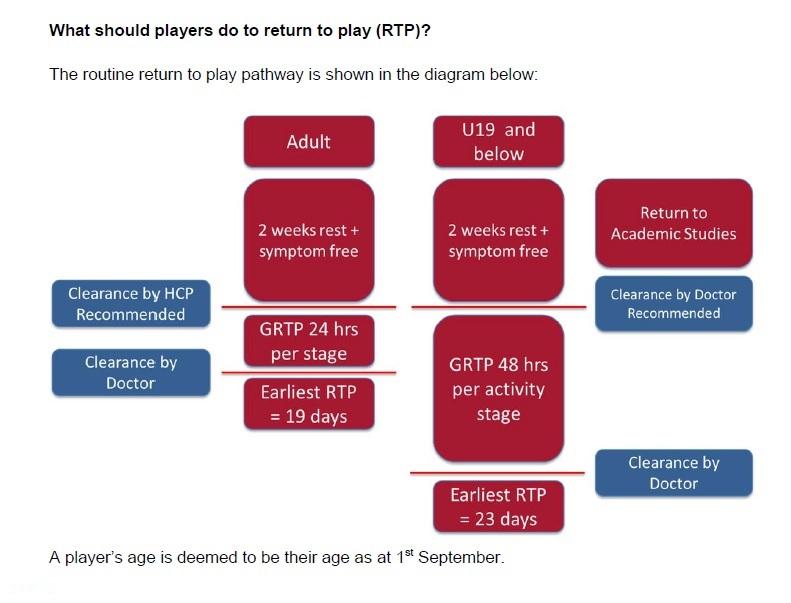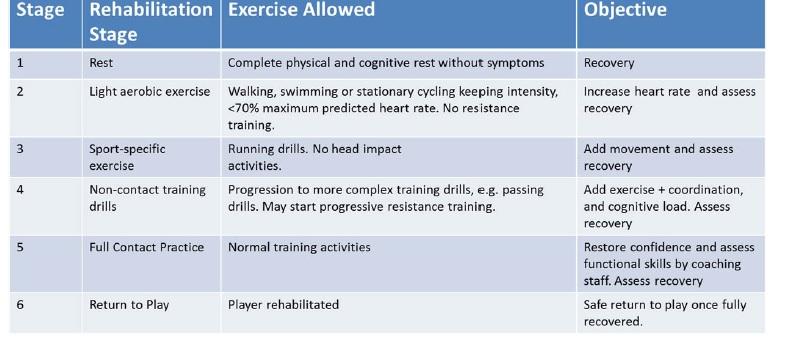Return to play following concussion (summary of guidance relating specifically to rugby)
Return to play after concussion
- concussion must be taken extremely seriously to safeguard the short and long term health and welfare of players, and especially young players. The majority (80-90%) of concussions resolve in a short (7-10 days) period. This may be longer in children and adolescents and a more conservative approach should be taken with them.
- during this recovery time however, the brain is more vulnerable to further injury, and if a player returns too early, before they have fully recovered this may result in:
- prolonged concussion symptoms
- possible long term health consequences e.g. psychological and/or brain degenerative disorders
- further concussive event being FATAL, due to severe brain swelling - known as second impact syndrome
What should players do to return to play (RTP)
The routine return to play pathway is shown in the diagram below:

A player's age is deemed to be their age as at 1st September
Graduated Return to Play (GRTP)
The GRTP should be undertaken on a case by case basis and with the full cooperation of the player and their parents/guardians. Where a club/school has their own medical resources the GRTP process should be carried out by the club/school coach, and overseen by the club/school health care professional/doctor. Parents should where possible also be actively involved in the process.
A summary of the GRTP is shown in the following diagram (2)

Before a player can commence the exercise elements of the GRTP i.e. Stage 2, they must be symptom free for a period of 24 hours (adult) or 48 hours (U19) (This is Level 1)
- the player can then progress through each stage as long as no symptoms or signs of concussion return. Where the player completes each stage successfully without any symptoms the player would normally proceed through each stage on successive days. In U19s, progression should take 2 days for each stage
- if any symptoms occur while progressing through the GRTP protocol, the player must consult with their medical practitioner before returning to the previous stage and attempting to progress again after a minimum 24-hour (adult) or 48 hour (U19) period of rest, without the presence of symptoms
- if it is not feasible for the coach to conduct Levels 2 - 4, these may be done by the player in their own time or in children supervised by parents with appropriate guidance. Alternatively the protocol may simply be extended with each level being conducted by the coach at training sessions or in the school setting by other PE staff during PE lessons, when they are able
On completion of Level 4 the player may resume full contact practice (Level 5) with Medical Practitioner clearance.
It is the player's or parent's responsibility to obtain medical clearance before returning to play (2)
Schools and clubs are advised to keep a record of the player's or parent's confirmation that clearance has been obtained and a doctor's letter is not necessarily required. On completion of Level 5 without the presence of symptoms, the player may return to playing in full contact rugby games (Level 6).
Reference:
- 1) International Rugby Board (accessed 8/3/2015).Concussion Guidance for the General Public
- 2) England RFU website (accessed 8/3/15). Concussion in Rugby
Related pages
Create an account to add page annotations
Annotations allow you to add information to this page that would be handy to have on hand during a consultation. E.g. a website or number. This information will always show when you visit this page.